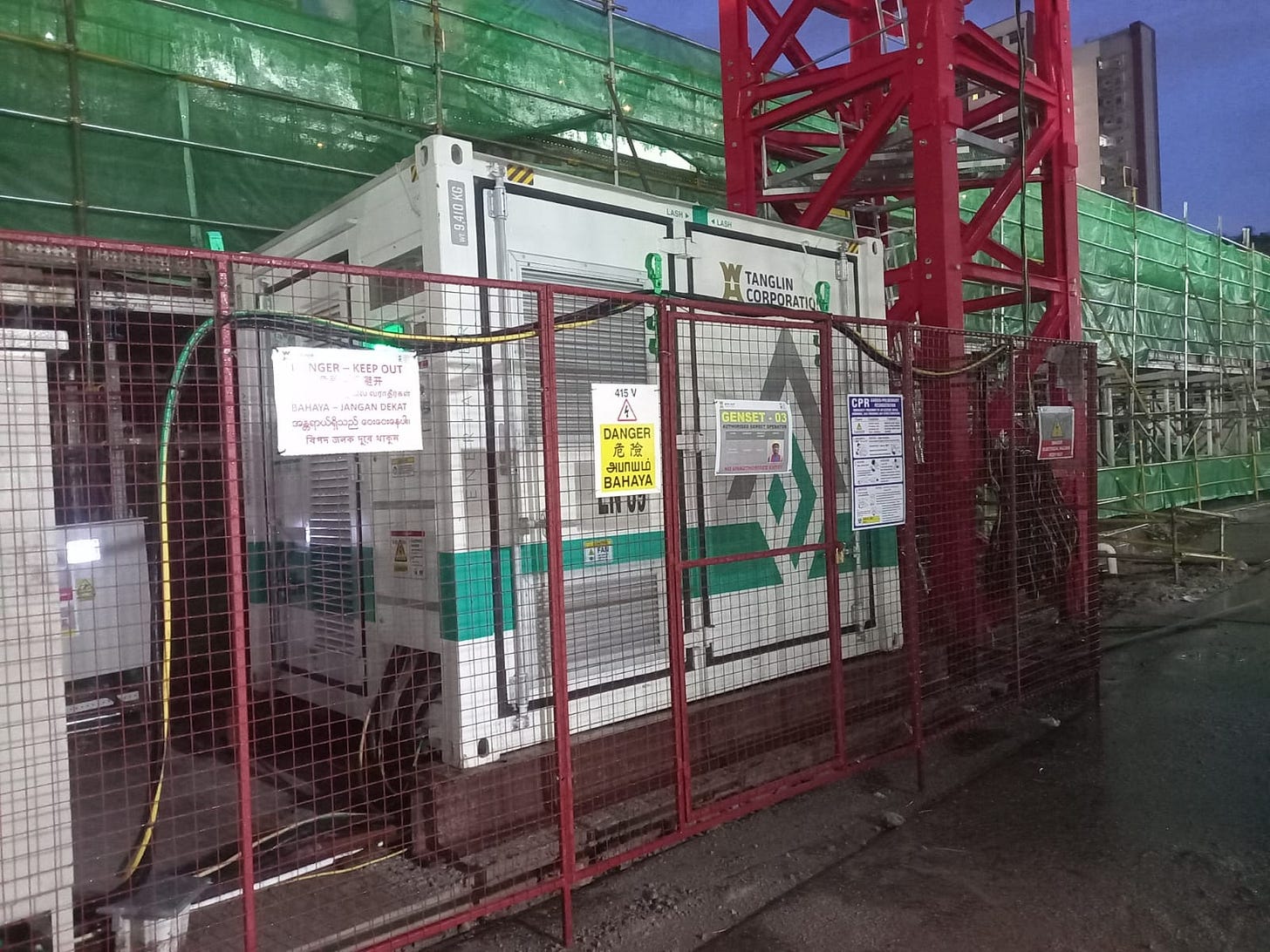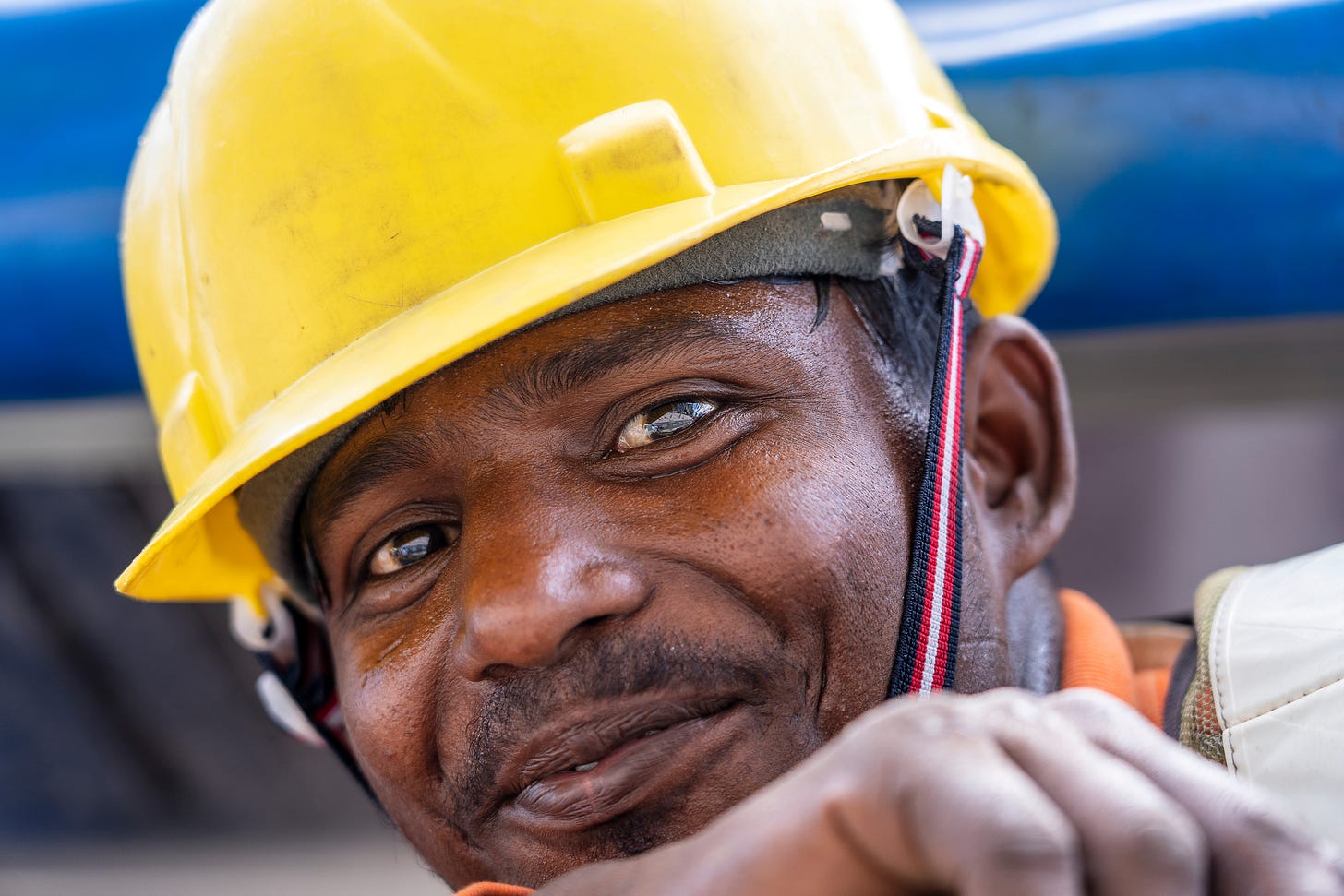⚡Plug In: The State of Electrification
Hear from experts at Woh Hup and Gammon Construction about replacing diesel generators with BESS | Construction HR Handbook | Upcoming SCAL Events
Builders,
We can all sympathise with batteries: they’re either working, or they’re dead.
Since 2021, Singapore contractors have begun replacing diesel-powered generators at construction sites with Battery Electric Storage Systems (BESS). This technology reduces operating costs, lowers noise levels, and cuts carbon emissions by up to 85%.
In this first edition of The Contractor, we spoke with two early adopters of BESS systems, Yong Jian Rong, COO at Woh Hup, and Michael O’Connell, General Manager at Gammon Construction.
A quick primer on BESS:
BESS systems are giant rechargeable batteries which are modularized into a container-like structure deployed on site. They can be charged with a low voltage cable off the electric grid, or with excess energy generated by renewable sources like solar.
BESS can be used for power amplification, load leveling, or backup power, helping to manage energy demand and lower costs.
The systems are best when used as a “power amplifier”, being charged slowly throughout the day and then be deployed for applications like tower cranes, hoists, welders, and desanders which intermittently gobble up lots of current in short order.
Benefits include lower operating costs than diesel generators, reduced noise levels, improved energy resilience (as a backup), and substantially lower carbon emissions.
💰 1 - Higher Upfront CapEx vs. Cost Savings
Depending on usage, the OpEx saved by using BESS map out to a roughly seven-year payback period (the system CapEx, relative to the diesel fuel savings).
As yet, there are no subsidies available to help defray these costs and compress the payback period. However, the BCA announced that the Energy Efficient Grants (EEG) scheme will be extended to contractors in late 2024.
The specifics are being finalized, but local builders will be able to avail of grants at either S$35K or S$350K levels (up to 70% of the equipment cost), subject to eligibility requirements and carbon emission savings. SCAL will update its members as and when these grants become available.
“Like any new technology, electrification requires an initial leap of faith. Our first experiences with BESS at the One Holland and Irwell Hill sites have been positive.” - Yong Jian Rong, COO, Woh Hup Limited
Another key to defraying upfront costs will be developers beginning to specify the use of low-emissions equipment as part of the tender process. A top-down, demand-side driven push will level the playing field for contractors who may be wary of making the initial capital outlay unprompted. For progressive developers, encouraging clean technology in downstream supply chains brings them closer to their Net Zero goals.
⚡2 - Connecting Sites to the Grid, Sooner
SCAL has begun engaging with utility providers like SP Services to explore connecting sites to the power grid much earlier in the build process. This is a key enabling step to making systems like BESS or Electric Vehicles feasible at a greater variety of work sites, including at remote greenfield projects.
There are, however, environmentally friendly alternatives, even when connections to the grid aren’t immediately available, including the use of biodiesels and hybrid equipment.
Yong Jian Rong notes that modest OpEx savings are also possible by pairing a BESS system with a small, efficient diesel generator, in lieu of grid availability.
Beyond battery storage issues, several manufacturers of electric construction vehicles, SCAL spoke with, each cited the lack of charging infrastructure as a key impediment to broader adoption of construction EVs on construction sites.
Progress is being made, however. SCAL’s engagement with the Singapore Civil Defense Force last year, contributed to regulatory clarity around the fire safety management aspects of deploying BESS.
🛠️3 - Where and How to Start?
“Battery-powered hand tools may be the lowest-hanging fruit for many contractors.” - Michael O’Connell, General Manager, Gammon Construction
Aside from being environmentally friendly, battery-powered hand tools already offer a range of benefits over pneumatic equipment. Among them are better operator ergonomics (quieter & lower vibration), not needing to maneuver around air hoses, removing the tripping hazard that hoses present, and being lighter weight.
Electrifying hand tools saves meaningful costs. Compressed air leakage can be as high as 30%, while accounting for up to 10% of a site’s electric consumption, according to a study by tool-maker Stanley.
A range of vendors provide battery-powered equipment in Singapore. Contractors are welcome to contact SCAL for more information about the available options.
🌳 4 - Narrowing the Green Premium
Coined by Bill Gates, the concept of a “Green Premium” is the additional cost of choosing a clean technology over one that emits more greenhouse gases.
Before the EEG grant regime is available contractors, which will alter the economics of electrification and compress Green Premiums, there are still compelling starting points available today.
Michael O’Connell notes that cranes and excavators are challenging use-cases to electrify. He suggests contractors explore smaller and mid-sized electric equipment options such as boom- and scissor- lifts as a good starting point, with manageable green premiums.
Today’s BESS systems already offer lower operating cost profiles than their diesel counterparts, albeit at higher initial outlay. Some vendors do, however, offer leasing and rental programmes as an alternative to capital investment.
Construction EVs are on the horizon, but operational limitations (for instance, long recharging periods which are problematic in 24-hour use environments), and a Green Premium of roughly 250% to 300% over diesel equivalents remain barriers to wider adoption in Singapore.
We expect construction Green Premiums will continue to fall over time. Wider adoption will create economies of scale for the manufacturers. There is extensive global R&D and innovation taking place in core technologies including EVs, batteries, and biofuels.
🤷🏻♀️So, how?
Expect that Singapore’s nationwide push towards Net Zero by 2050, a reduction of 60 million metric tons of carbon dioxide equivalent, will be a key consideration driving policy and regulation moving forward.
Contractors who experiment with electrification early will benefit both from operationalizing the know-how and will find themselves increasingly competitive as carbon reduction efforts ramp up with the end clients, and manifest as tender considerations.
BESS, battery-powered tools, and smaller equipment already yield operational cost savings today, and will only get better over time.
Mid-way solutions, such as pairing BESS systems with small diesel generators, or equipment like hybrid excavators are options to explore.
SCAL will continue to engage with regulators and service providers to push electrification forward from both the perspective of grid availability and incentive structures for progressive contractors ready to take the leap forward.
Have Your Say: do you use Electric Equipment?
Do you have any experiences with site electrification you’d like to share with the contractor community? Whether its BESS, electric hand tools, EVs, or other equipment, we’d love to hear your thoughts!
Leverage strategic HR insights to strengthen your team.
In partnership with the IHRP, SCAL has launched the Human Resource Guidebook for Construction. This free resource is designed to help contractors upgrade their HR practices from being an operational function towards becoming a strategic asset to attract, retain, and upgrade talent.
The guidebook covers change management, employee engagement, career progression, training and development, flexible work arrangements, and the regulatory regime in Singapore.
Upcoming SCAL Events
2-4 June 2024 - World Cities Summit
SCAL is a strategic partner of the 2024 World Cities Summit in Singapore. WCS is an exclusive platform for government leaders and industry experts to address livable and sustainable city challenges. More information can be found on the WCS website.
5 June 2024 - Remote Supervision Masterclass
“Improving Productivity and Data Management Through Remote Supervising”. A Masterclass jointly organized by SCAL and Autodesk Construction Cloud.
12 July 2024 - SCAL’s CEO Networking on the Green
SCAL’s popular CEO Networking on the Green event returns on 12 July at the Tanah Merah Country Club. This annual event is a platform for industry executives to mingle and network on the fairways at one of Asia’s most prestigious golf destinations.
To sign up and participate, or to enquire about sponsorship opportunities, please visit the event’s landing page here:
Please Help Us Spread the Word!
The Contractor is a free publication. We’d really appreciate if you could share this with your colleagues and friends in the industry who might it helpful:
Thank you!
The SCAL Team





